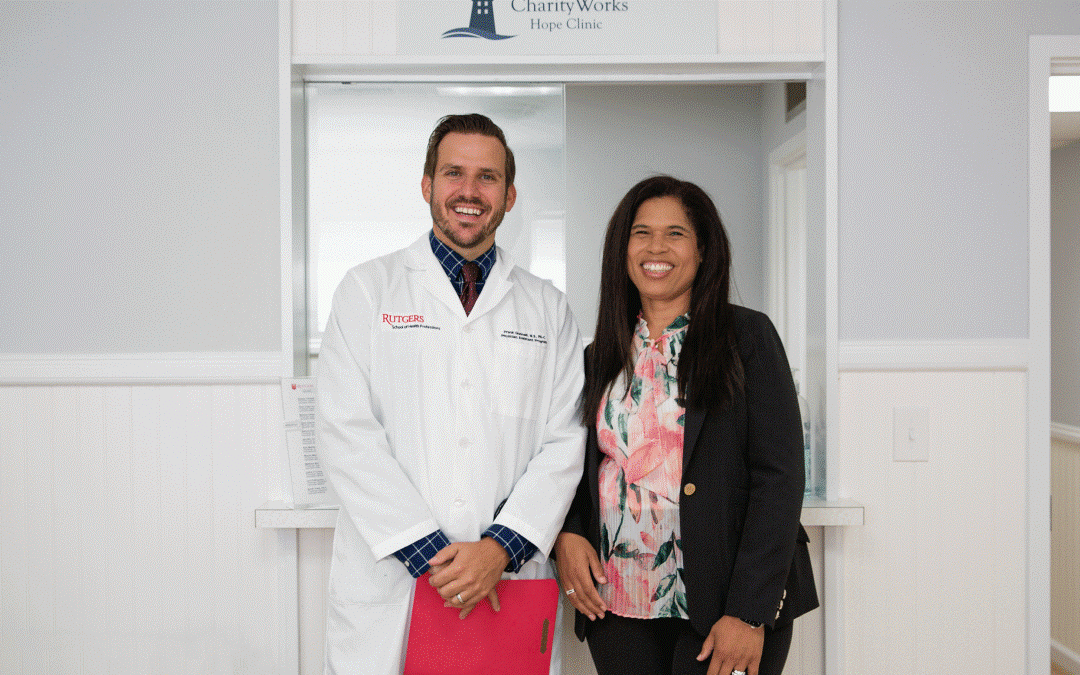Rutgers is teaming up with Quest Diagnostics to provide no-cost laboratory tests over the next year to diagnose and manage acute and chronic diseases for uninsured and underinsured patients of the university’s H.O.P.E. Clinic in Plainfield, New Jersey.
This will include lab tests for chronic conditions such as diabetes, hypertension, sexually transmitted infections, and Lyme disease.
Under the program, clinicians send laboratory orders directly to a nearby Quest patient service center, which allows patients to visit immediately after their appointment. The results are transmitted directly back to the clinic for follow up with the patient.
Gianella Burga, a physician assistant student at Rutgers who volunteers at the H.O.P.E. Clinic, which is owned and operated by the Rutgers School of Health Professions, knows firsthand how difficult it is for people without insurance to access even the most basic medical care, such as lab tests.
“Many of my family members are uninsured and struggle to get testing for conditions like diabetes or high cholesterol. It’s difficult for them to take a day off from work for a doctor’s visit and then another day for tests,” said Burga. “This is why I went into medicine: to address these gaps in care.”
Burga is one of about 75 students who volunteer at the H.O.P.E. Clinic, which provides free primary care to hundreds of uninsured adults in Plainfield, many of whom are Spanish speaking.
One day each week, Rutgers faculty and physician assistant students see patients who are trying to manage acute and chronic diseases and provide them with referrals to specialists as well as critical education on managing their health conditions.
For well over a decade, the Rutgers physician assistant program has provided free primary care services in various locations throughout the state. The H.O.P.E. Clinic, which was opened in 2021, provides an essential service to a city where about 30 percent of residents are uninsured and 39 percent report not having a primary-care provider.
Following through with lab tests can be challenging for this community and can compromise their care, said Frank Giannelli, director of the H.O.P.E. Clinic and an assistant professor in the physician assistant program at Rutgers School of Health Professions.
“If lab tests are required, the patient has to find a lab, schedule an appointment, receive the lab results, and bring them back to us for a consultation,” Giannelli said. “It’s a multi-step process where, at any point, something can go wrong or they may find the cost is astronomical and leave. Navigating this process is difficult – especially for non-English speakers – and could ultimately prevent them from getting the treatment they need.”
“This one-stop-shop testing streamlines the process and makes it easier for patients to receive the treatment they need,” said Jessica Romero, a physician assistant student at Rutgers who works at the clinic.
Quest, the world’s leading provider of diagnostic information services, has a history of helping underserved and minority communities throughout the nation gain access to the information they need to take control of their health. Recognizing early in the pandemic that COVID-19 was having a disproportionate impact on communities of color, the company launched Quest for Health Equity with an initial focus on giving these communities access to COVID-19 testing and critical health care services.
“This has since grown to become a more than $100 million initiative focused on addressing health care disparities,” said Ruth Clements, vice president and general manager of infectious diseases and immunology at Quest Diagnostics and leader of Quest for Health Equity. “This collaboration with Rutgers is a great example of joining forces to make a difference in underserved communities. As our headquarters is based in New Jersey, we are honored to work to address health inequities in our home state with a strong teammate like Rutgers.”
The H.O.P.E. Clinic is one of an estimated 1,400 free and charitable clinics in the U.S. that serve about 7 million people annually. Quest’s commitment to the clinic addresses a concern Giannelli sees nationwide.
“Not only does being uninsured make accessing health-related services challenging, but people who are uninsured disproportionately use emergency departments for the management of conditions that could easily be managed in the outpatient setting,” he said. “Based on the average one-time emergency department visit cost of $1,389, free clinics save emergency departments an estimated $9.6 billion each year. When companies such as Quest help reduce barriers to care in uninsured populations, it allows clinicians to make realistic treatment plans that will help keep people out of the hospital, which is also good for our nation’s health care costs.”
This story originally appeared in Rutgers Today.

